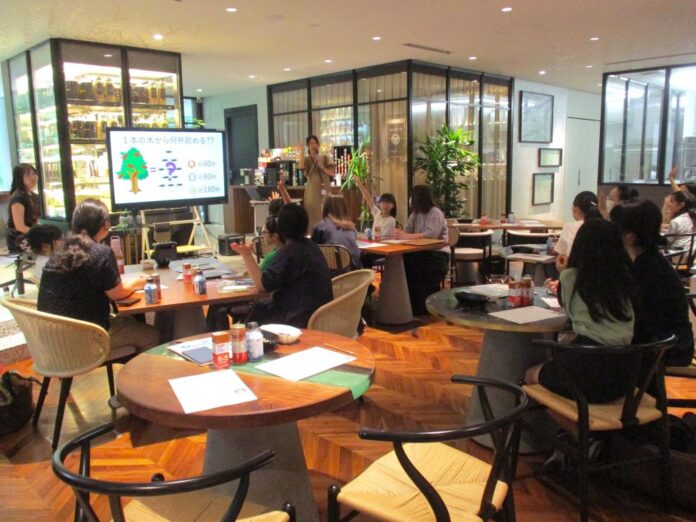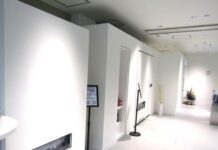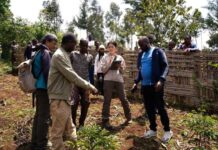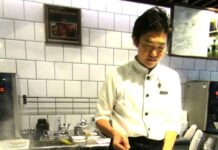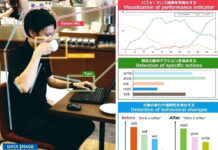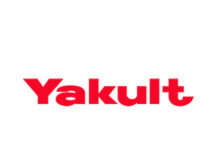UCC Japan held a free seminar for elementary school students and their parents from July to August to learn about social issues and SDGs through coffee.
The main aim is to create opportunities for elementary school students to learn about coffee and hydrogen, and to have a positive image of them.
The target is 4th to 6th graders and their parents. On August 8, 7 groups of elementary school student and parent, total 14 people participated in the seminar held at the UCC Group Tokyo Headquarters (Minato-ku, Tokyo).
In the seminar, while showing the actual coffee beans before and after roasting, the company explained that there are many processes to go through before a single cup of coffee is made. As the number of suitable areas for coffee cultivation is decreasing due to global warming, they introduced the hydrogen as an earth-friendly energy source and what kind of element hydrogen is.
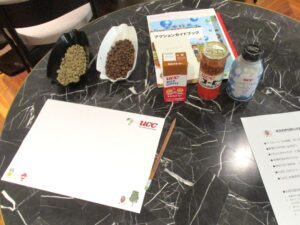
As an example of the use of hydrogen energy, they gave away bottled coffee “UCC Hydrogen Roasted Coffee Ethiopia G1 Irgachefe Region” made with beans roasted using hydrogen as a heat source. Materials that can be used for students’ summer vacation research were also handed out.
The lecturer was Chiaki Ganno, assistant manager of the Sustainability Promotion Office, Sustainability Promotion Division at UCC Japan.
She says, “Rather than having people remember it as knowledge, my goal is set to give them a good sensory image of hydrogen and that UCC is working on it. Furthermore, I would be even happier if they reconsider environmental issues and take actions such as not leaving the lights on.”
The company holds SDGs seminars for elementary school students from 2023. This year, based on the fact that mass production of hydrogen roasted coffee began in April, they added content related to hydrogen for the first time.
When addressing hydrogen in the seminar, “We can talk about coffee, but it was difficult to talk about hydrogen and answer questions,” she says, and Kawasaki Heavy Industries personnel was invited as a special guest for the seminar for the first time.
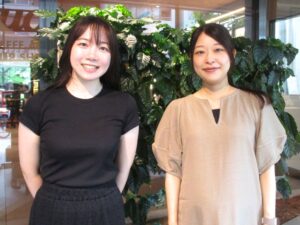
Risako Kuroda, Communication section of Planning Department, Hydrogen Strategy Division at Kawasaki Heavy Industries, who took the stage at the seminar, recalls, “This seminar was also a great benefit for our company.” Ms. Kuroda says, “It is predicted that hydrogen will be available in society around 2040 to 2050 years, so I wanted today’s elementary school students, who will be adults by that time, to become familiar with hydrogen. When we were considering awareness activities for children this year, we received an invitation from UCC.”
She also points out that it was also of great significance to partner with UCC.
“We did not have the know-how to conduct seminars for children related to hydrogen. Furthermore, since our business is mainly for business use and is not close to daily life, we found it difficult to get people familiar with it. Therefore, it was a great opportunity to work with UCC, which has seminar know-how and is actually making products that everyone can eat. I want children to feel close to energy and hydrogen through the seminar.”
UCC plans to continue to strengthen seminars for elementary school students going forward.
Ms. Ganno says with enthusiasm, “It can be difficult for one company alone, so I would like to expand the communication through collaboration with like-minded companies and local governments. We will continue the seminar going forward targeting mainly elementary school students.”
A total of nine seminars were held from July to August at two locations: UCC Group Tokyo Headquarters and UCC Group Kobe Headquarters (Kobe City, Hyogo). By pre-registration, 95 groups of elementary school student and parent, and total 190 participants were recruited.

